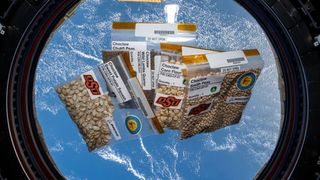Seeds flown to space last year will be planted on Earth this spring as part of a cultural and STEM (science, technology, engineering and math) study.
Five varieties of heirloom seeds from the Choctaw Nation of Oklahoma — including Isito (Choctaw Sweet Potato Squash), Tobi (Smith Peas), Tanchi Tohbi (Flour Corn), Tvnishi (Lambsquarter), and Chukfi Peas — were flown to the International Space Station (ISS) in November 2023.
The seeds, which together weighed just over a pound (500 grams), were exposed to microgravity and space radiation for more than five months, returning to Earth in April 2024.
The project, called the Choctaw Heirloom Seeds investigation, aims to inspire Native American youths to pursue careers in STEM according to a statement from NASA.
Related: Scientists grow 1st plants in moon soil
Students at the Jones Academy boarding school for Native Americans in Oklahoma will plant the seeds in the school's Growing Hope Garden this coming spring alongside a control group of the same seed varieties that did not travel to space and back.
As part of the experiment, students are asked to make a prediction about the growth of the two seed groups and will conduct observations and compare the plants' growth to test their hypotheses.
"This project elevates Native culture and voices in a society where Native populations are underrepresented in STEM fields," according to a statement about the experiment. "This investigation is intended to inspire Native youths to pursue careers in STEM."
The seeds' journey to space and subsequent garden experiments are also being added to the middle school's STEM curriculum, allowing even more students to benefit from the research and learn about the impacts of space.

.jpg) 14 hours ago
1
14 hours ago
1

 English (US)
English (US)